Wild animals being kept as pets
africanvioletlvr
17 years ago
Featured Answer
Comments (50)
beeanne
17 years agolast modified: 9 years agokms4me
17 years agolast modified: 9 years agoRelated Discussions
trouble letting wild turtles be wild
Comments (14)The critters that show up are often able to find a way into our lives and we have to take care they don't become dependent on us. When we encourage them to interact with humans we are not doing them any favors. Not long ago I had a big problem with a group of raccoon that someone had obviously been hand feeding. Its not always a human problem though. Right now I am having a nightly argument with our cat who wants the young possum in our back yard to come into the house. We didn't realize we had a visitor until DH mentioned the cat was cleaning her dish rather well. I looked, it was polished, I started searching. Sure enough, it was in the laundry room. It took 30 hours of trying to corner it while keeping the cat out of it. At one point when I was attempting to shoo it out a door, two raccoon came charging in to get the bowl of cat food I was using as bait. Fortunately I had my cane in hand and was able to shoo them back outside but not before they emptied the bowl. I was finally able to grab the possum by the tail after tossing a towel over it's head. I took it outside but an hour later it strolled into the living room. The cat had popped a different door open. This time the chase was not as long but I'm an old lady and I can't move as fast as I used to. Thank goodness that tail works well to control them. (I have a long history catching possum by their tails. I just wish DH was not so squeamish about critters). While a turtle doesn't move as fast and doesn't hide as well, they can be as stubborn as the possum and raccoon and their bite can be nasty. Try not to interfere if you can avoid it....See MoreWild animals as entertainment
Comments (10)I have no problems with Jeff Corwin and especially Steve Irwin, the Crocodile Hunter. He lived for conservation. What you see on TV was just the tip of the iceberg and it got millions of people to care about crocodiles and snakes. He spent millions of dollars worldwide on conservation projects and scientific research. Plowed the money made by the TV shows into conservation and upgrading Australia Zoo also a state of the art vet hospital where they treat and release thousands of injured and sick wild animals. The crocodiles captured were being saved or being used for research. Australia routinely shot them before Irwin and his father before him starting moving them or removing them to the zoo to save them. Anyone ever watch Wild Kingdom? They jumped out of helicopters and off jeeps and horses on to the animals to catch them because it is safer than drugs. All those animals that were caught and radio collared, measured and blood tested add to the database of knowledge about the animals. Many were also relocated because of human development. The more scientists know about a species, the better armed they are to save it. Zoos, animal parks, aquariums (that have safe, healthy habitats and healthy, happy animals) help the wild ones because they get people to care. I've never been to any such facility that didn't have education and conservation as their purpose. Zoo raised animals are being released into the wild, endangered species are being saved in zoos. California Condors, Black Footed Ferrets, Arabian Oryxs (an antelope) Prezewalski's Horses, Pere David's Deer have all been saved by captive breeding and are now back in the wild. There are many more projects like these going on world wide. Accredited zoos keep studbooks and have Species Survival Plans and share knowledge and animals for breeding around the world to benefit the various endangered species. It would be fabulous if all animals lived free and wild but it isn't an option with the billions and billions of people on this planet. Millions of whom could not give a rip if all animals were gone, all forests cut down, all ground drilled etc. as long as it doesn't affect them, personally, right now....See MoreOk to keep Exotic Animals as pets?? Just curious.......
Comments (66)There is nothing wrong with taking care of an animal that couldn't reasoably be expected to thrive if returned to his/her native environment. Knowledge and preparation are the key. I have 5 Burmese Pythons living in their own large upstairs bedroom. They all came to me as rescues. Three have been with me since 1984. They have their own heating system, plywood sheathed walls, expanded metal gratings on the outside of their windows. Cleaning their room and watering trough are onerous duties that have to be performed weekly. Feeding and electricity to keep them warm are expensive. All things considered, it is an expensive hobby that I love. They have individual personalities, much like cats. Let me add this: we have a responsibility to assure a good life to our pets if we suddenly leave the picture. I have it in my Will; my executrix and my kids all know that I have 2 different individuals lined up to come in and whisk these "special" animals away in the case of my sudden demise....See MoreHow long should it take to get approved for a pet from a pet rescue?
Comments (24)Salti, I think it's great that you had an experience with an agency that you felt did not get their responsibilities confused. I can also see why it might be more reasonable for the process to take as long as it did with the breed and situation you chose to adopt under, but not everyone is having a similar experience. Granted fosters have lives and scheduling can be an issue, but part of the responsibility of fostering is making the animals you're fostering available. This was actually said to me a few years back when I thanked a foster for her quick response while we were looking to adopt. As with the OP, if a potential family goes through the process of filling out paperwork, a home inspection and a LONG wait period because they want to bring a dog into their home, I'm more inclined to believe that they are probably a positive placement for a dog and the problem is the agency. Granted, placement is not black and white; finding the right forever home does have a lot of grey areas to consider like the animals history, breed compatibility, family dynamics and yes, environmental situations too but it should be a joint effort to figure that out, not the fosters alone. The OP says they only got to see one dog and never got a chance to see if other dogs would be a better fit for them. If you do the research and read some of the articles on this subject, you'll see there is a negative trend in the adoption world. Too many dogs go unadopted and left in less desirable situations because the "agency" trying to adopt them out is over zealous in their placement requirements. Look at how many people posting here have said they were rejected for one reason or another and subsequently had to find a dog elsewhere. All the dogs that they eventually paired up with are absolutely loved and have thrived in good homes. If a family really wants a dog they will get one in spite of the challenges poised by an agency. The family ends up with a dog but what about the dogs that are left behind? Also whether a rejection is for a good reason or not, it just seems like there are a lot of agencies who don't seem to have much regard or concern for the adopting family. If a family, especially one with kids shows an interest in an animal but doesn't qualify for whatever reason, the agency should at least reach out and communicate their concerns. What if the concern is a minor misunderstanding or there is a simple fix that can make things right? The dog could still have a chance at a good home. Follow up regardless of the decision is just common decency and the families deserve that. Lastly, I wouldn't just assume that a pet adoption agency was right just because placing dogs is what they do. As far as I know there are no requirements when it comes to credentials or certifications for the fosters. Obviously, some are pretty confused about what really matters and what doesn't matter at all....See Moreafricanvioletlvr
17 years agolast modified: 9 years agolynn_d
17 years agolast modified: 9 years agomoonie_57 (8 NC)
17 years agolast modified: 9 years agooakleif
17 years agolast modified: 9 years agogaryfla_gw
17 years agolast modified: 9 years agofayehughes
17 years agolast modified: 9 years agoafricanvioletlvr
17 years agolast modified: 9 years agoElly_NJ
17 years agolast modified: 9 years agoworld_peace
17 years agolast modified: 9 years agofancifowl
17 years agolast modified: 9 years agoElly_NJ
17 years agolast modified: 9 years agomore_to_grow
17 years agolast modified: 9 years agoanettemartinrn
17 years agolast modified: 9 years agobeeanne
17 years agolast modified: 9 years agoNancy in Mich
17 years agolast modified: 9 years agobeeanne
17 years agolast modified: 9 years agoNancy in Mich
17 years agolast modified: 9 years agobeeanne
17 years agolast modified: 9 years agosteve2416
17 years agolast modified: 9 years agobeeanne
17 years agolast modified: 9 years agoElly_NJ
17 years agolast modified: 9 years agoUser
17 years agolast modified: 9 years agoLily316
17 years agolast modified: 9 years agoanya_101
17 years agolast modified: 9 years agoElly_NJ
17 years agolast modified: 9 years agoElly_NJ
17 years agolast modified: 9 years agoLily316
17 years agolast modified: 9 years agoLily316
17 years agolast modified: 9 years agoanya_101
17 years agolast modified: 9 years agoshare_oh
17 years agolast modified: 9 years agoElly_NJ
17 years agolast modified: 9 years agoacorn
17 years agolast modified: 9 years agobeeanne
17 years agolast modified: 9 years agobill_vincent
17 years agolast modified: 9 years agoLily316
17 years agolast modified: 9 years agoanya_101
17 years agolast modified: 9 years agobeeanne
17 years agolast modified: 9 years agofancifowl
17 years agolast modified: 9 years agobeeanne
17 years agolast modified: 9 years agoacorn
17 years agolast modified: 9 years agocharita
16 years agolast modified: 9 years agoccoombs1
16 years agolast modified: 9 years agofathomboy91
16 years agolast modified: 9 years agofathomboy91
16 years agolast modified: 9 years agoElly_NJ
16 years agolast modified: 9 years agoines_99
16 years agolast modified: 9 years agoMichelle Fonzi
8 years agolast modified: 8 years ago
Related Stories
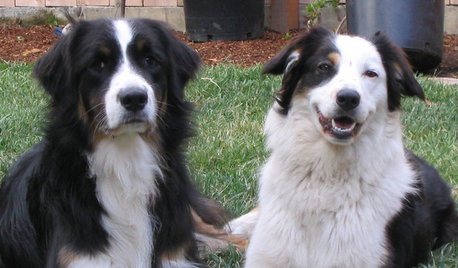
PETSDealing With Pet Messes: An Animal Lover's Story
Cat and dog hair, tracked-in mud, scratched floors ... see how one pet guardian learned to cope and to focus on the love
Full Story
DECORATING GUIDESExpert Talk: Walk on the Wild Side With Animal Art
Bring untamed power and energy to your interiors with sophisticated, personal or just darn cute animal art
Full Story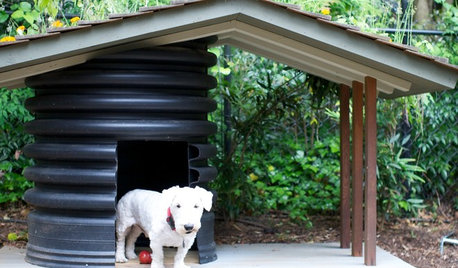
PETSHow to Help Your Dog Be a Good Neighbor
Good fences certainly help, but be sure to introduce your pup to the neighbors and check in from time to time
Full Story
FUN HOUZZ31 True Tales of Remodeling Gone Wild
Drugs, sex, excess — the home design industry is rife with stories that will blow your mind, or at least leave you scratching your head
Full Story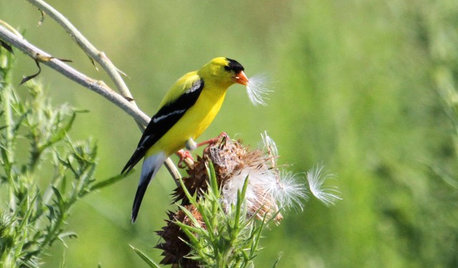
GARDENING FOR BIRDSWild Birds Transform a Woman’s Garden and Life
How Sharon Sorenson created a wildlife haven and became the Bird Lady of Southern Indiana
Full Story
LANDSCAPE DESIGNLiving on the Edge of the Wild
When Mother Nature is your neighbor, the possibilities — and responsibilities — can be that much greater
Full Story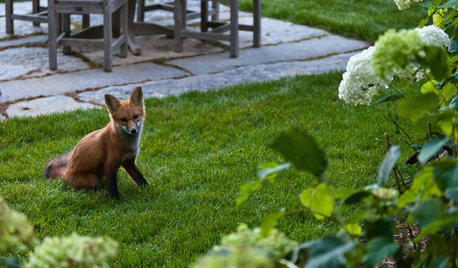
FUN HOUZZThe Cutest Darn Animals on Houzz
You might end up admiring these horses, goats, llamas and more until the cows come home
Full Story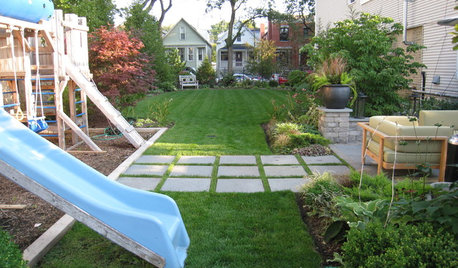
LIFE6 Tips for Teaching Your Kids to Be Good Neighbors
Everyone wins when your children learn to respect boundaries, get help when they need it and show others they care
Full Story
BATHROOM DESIGN14 Bathroom Design Ideas Expected to Be Big in 2015
Award-winning designers reveal the bathroom features they believe will emerge or stay strong in the years ahead
Full StorySponsored



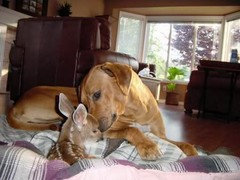

Meghane